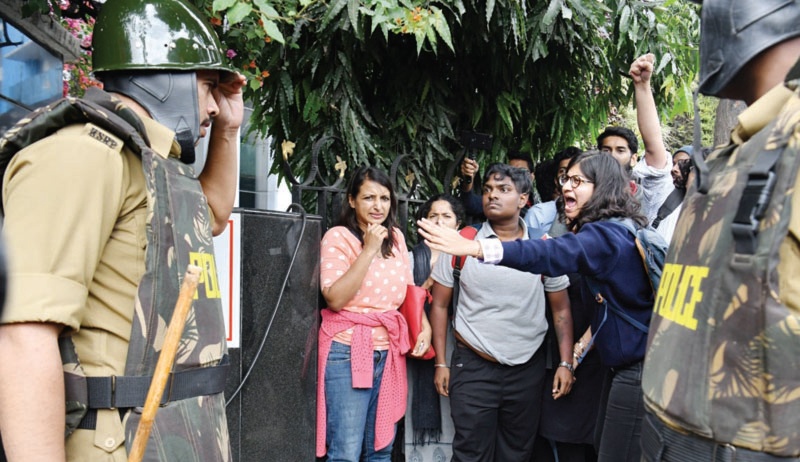Thousands defy bans, historian Guha arrested

NEW DELHI: Indian authorities cut cellphone access in parts of Delhi yesterday and fresh violence erupted elsewhere, as thousands of protestors nationwide defied bans on assembly in growing anger at a new citizenship law seen as anti-Muslim. Police and demonstrators clashed in Uttar Pradesh state as security forces bundled demonstrators including an internationally famous historian onto buses in Delhi and Bangalore, as 19 metro stations were shut in the capital and major roads blocked.
The new law eases citizenship rules for people fleeing persecution from three neighboring countries, but excludes Muslims, stoking accusations that Prime Minister Narendra Modi wants to reshape India as a Hindu nation and creating unease abroad. Seven months after Modi swept to a second term, India has seen a week of protests in which four people were shot dead, dozens injured and hundreds arrested, while authorities have banned gatherings in areas that together are home to hundreds of millions of people.
They included all of Uttar Pradesh and Bangalore, areas of the northeast and parts of Bihar, New Delhi, Hyderabad and Chennai. All of them have seen protests in recent days, and in the case of the capital, riots and police storming a university. Delhi police spokesman M S Randhawa told AFP that “people should seek permission to assemble at places” where the ban is not in place. Indian police yesterday detained one of the country’s most respected historians and intellectuals, Ramachandra Guha, yesterday during a demonstration in the southern city of Bengaluru against a new citizenship law based on religion.
Indian news channels showed footage of Guha being dragged by three policemen near barricades erected to hold back protesters challenging the law, which critics say is prejudicial to Muslims and undermines the country’s secular constitution. “I am protesting non-violently, but look they are stopping us,” said Guha before being surrounded by police at the demonstration, one of four held in Bengaluru yesterday.
Demonstrators dragged
Fresh violence erupted in the Samhbal district of Uttar Pradesh as hundreds of protesters set fire to vehicles and threw stones at security forces who responded with tear gas, local police chief Yamuna Prasad told AFP. “We are trying to control the situation.
People have been asked to return to their homes,” Prasad said. Police fired tear gas in state capital Lucknow while in Modi’s home state of Gujarat police said they baton-charged demonstrators and arrested 50 people. As others ignored the assembly ban in Delhi and elsewhere, authorities ordered telecom firms to cut calls, text messages and data in parts of the city. India is already the world leader in cutting the internet, activists say, and online access was also restricted in parts of the northeast and in Uttar Pradesh, home to a large Muslim minority. Kawalpreet Kaur, Delhi President of the All India Students’ Association, tweeted that police had filled 14 buses with detainees at the Red Fort landmark in Delhi.
“But more and more people are pouring in, too many to be detained,” she added. In Bangalore one of those dragged onto a police bus was globally renowned historian Ramachandra Guha just as he was giving an interview. In the northeast, where the protests began last week-albeit for different reasons-around 20,000 people took to the streets in different locations. No violence was reported however after last week’s deadly clashes. But the day’s biggest demonstration so far took place in Malegaon in Maharashtra state-no assembly ban was in place-with as many as 60,000 people, police said. “It was all peaceful,” spokesperson ASI Pathan said. —AFP









